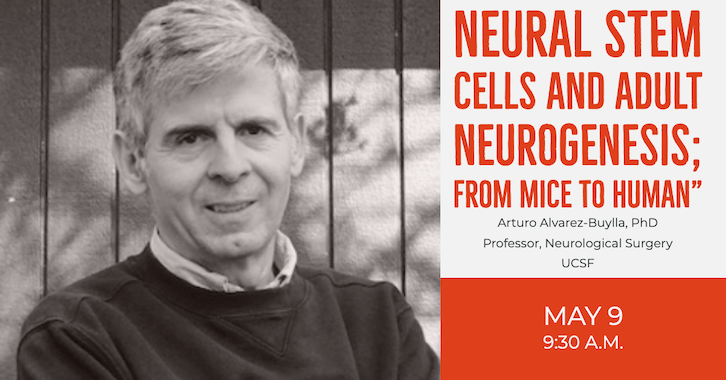May 9, 2019–May 9, 2019 from 9:30am–10:30am
Southern California Stem Cell Seminar Series, Present: Arturo Alvarez-Buylla, PhD, UC San Francisco

Arturo Alvarez-Buylla, PhD
Professor of Neurological Surgery University of California San Francisco School of MedicineHosted By:
Alysson Muotri, PhD Professor, Pediatrics and Cellular & Molecular Medicine UC San Diego Health Lab WebsiteBrief Biography
Dr. Alvarez-Buylla is internationally renowned for his work in developmental neuroscience and stem-cell neurobiology research. His principal research interests are in neurogenesis of the adult mammalian brain, neural stem cell regulation, the origin of brain tumors and brain repair.His work contributed to major findings on the identification and characterization of neural stem cells in the adult brain. The Alvarez-Buylla laboratory has continued studying the way in which adult neural stem cells behave and function – the generation of young neurons, the migration of these neurons from their site of birth to their final destinations, and their function in the adult brain. Understanding the mechanisms that underlie neuronal proliferation, differentiation, migration, circuit integration may offer insights into new strategies for treating brain damage and diseases.
Seminar Objective
The Stem Cell Program was founded on the unique strengths of the UC San Diego research community, with its unparalleled cross-disciplinary collaborations and strong basic and comparative biomedical science programs The University of California, San Diego Stem Cell Seminar Series is intended to stimulate the exchange of experience with researchers outside of UC San Diego, enhance interactions with sister institutions and biomedical campuses, and promote education in stem cell research. The monthly Stem Cell Seminar Series brings scientists from all over the world to the forefront of regenerative medicine and emphasizes the basic research and translational themes of stem cell research. These seminars provide an opportunity for the “Mesa” community to learn about the work being done by prestigious researchers from other institutions, preview unpublished scientific results, initiate collaborations and build networks. The speakers invited provide novel insights into stem cell functions, tissue development, and cell-based approaches for the treatment of diseases.Seminar Goals
We strive to promote unparalleled cross-disciplinary collaborations and strong basic and comparative biomedical science programs and support development of essential core facilities and facilitate training and educational activities.Solution
These goals are accomplished through presentations by distinguished invited speakers from various avenues of stem cell research and by poster presentations by graduate students and postdocs.Date and Time
May 9, 2019–May 9, 2019
from 9:30am–10:30am
Location
Duane Roth Auditorium, Sanford Consortium for Regenerative Medicine
Event Registration
Registration for this event is required
by .
Visit the registration page for details.
Event Fee
Free
Contact
Marci Murray • mjmurray@ucsd.edu • 858-534-8510
Audience
Faculty, Staff, Students, The General Public
Event Host
Alysson Muotri, PhD